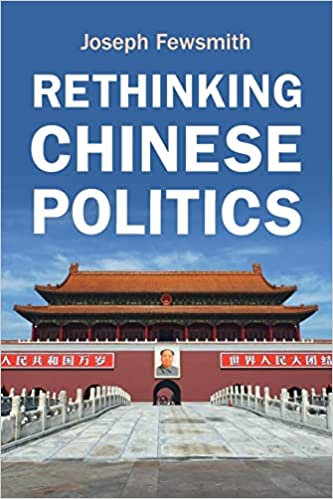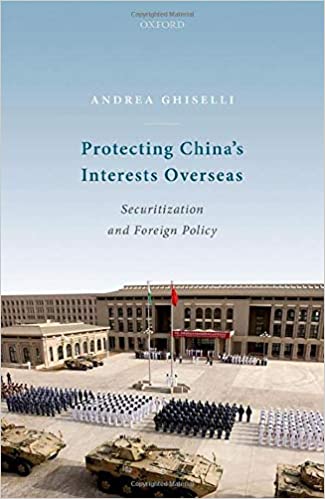
Review of Rethinking Chinese Politics by Joseph Fewsmith. Cambridge, 2021.
Joseph Fewsmith, a professor at Boston University, examines the leadership transitions between Deng Xiaoping, Jiang Zemin, Hu Jintao, and Xi Jinping to conclude that the notion that Chinese politics was institutionalizing was never in fact the case. Fewsmith writes that the Communist Party “cannot be institutionalized without destroying what makes it a Leninist party” – that is, hierarchical, mobilizational, and task-oriented. Each leadership transition has been circumstantially contingent and not without systemic risk as the outgoing leader seeks to preserve their influence, factions pursue a favorable realignment of the balance of power, and the new leader endeavors to establish their own autonomy. One wishes for more guidance on the extent to which Xi’s strength has come at the Party’s expense and, when Xi does ultimately seek to designate a successor, how the West should be prepared to respond.
The Party’s response to the coronavirus pandemic is outside Fewsmith’s scope, but is nonetheless an apt illustration of the tradeoffs of Xi’s centralization of power. In pursuing a post-vaccination Covid-zero policy, the country has avoided a still considerable number of likely deaths, but at the cost of isolation unbecoming of a global power, a growing sense of frustration among those disrupted by the stringent controls, an economic recovery hindered by repeated lockdowns, the forgoing of the productivity gains experienced by other societies which have responded to the pandemic with a reimagination of work and life, and the likely inability to reverse course without damage to its perceived authority. Studies have suggested that China’s people tend to have greater confidence in the central as opposed to local government. One seeming consequence of greater centralization is that this gap will close, most likely in the direction that is unfavorable to the Party’s long-run control.

Review of The World According to China by Elizabeth Economy. Polity, 2021.
Elizabeth Economy, based at Stanford’s Hoover Institution, surveys China’s strategic motivations, its attempts to influence other nations and reform global governance, and its aspirations to be the world’s technological – and thus, economic and military – leader. Economy writes that Xi Jinping’s primary strategic objective is to maintain his nation’s sovereignty and achieve the unification of Taiwan. China neither seeks nor is prepared to supplant the United States as global superpower; instead China seeks global influence disproportionate to its responsibility to exercise global leadership. In practice, China’s “state-centered model has limited the credibility and attraction of many of its initiatives” and its “exercise of sharp and hard power in the Asia Pacific has served to bind more tightly rather than unravel US-led alliances and partnerships.”
Written largely as a news summary interspersed with anonymous anecdotes from the author’s interactions with American and Chinese political and business actors, the book captures but does not meaningfully interrogate or advance the conventional wisdom. Economy, who has previously explored domestic politics under Xi, forgoes an opportunity to frame Xi’s foreign policy as being driven by either confidence or concern about the sustainability of China’s trajectory. Economy recommends that American policy be less China-centric and more focused on defending liberal norms and values abroad and at home, but offers no novel proposals for consideration.

Review of Protecting China’s Interests Overseas by Andrea Ghiselli. Oxford, 2021.
As China’s global footprint has swiftly expanded, it has necessitated a reconceptualization of the country’s definition of national security and new capabilities to defend them. Andrea Ghiselli, a professor at Fudan University, points to the evacuation of 36,000 Chinese nationals from Libya in 2011 as a turning point in how China approached non-traditional security issues. His reading of primary sources leads him to conclude that China’s policy response has been largely improvisational, focused more on protecting its development than advancing its influence outright. This conclusion is an important counter to those who assert China’s premeditated displacement of the United States.
The book focuses on China’s presence in the Middle East and North Africa, where, dependent on the region for energy and sea access to Europe, China is exposed to the region’s acute instability and has become an emerging terrorist target. Ghiselli’s work prompts important questions: how will China’s growing global footprint impact the CCP’s internal politics, both in terms of dynamics between the military branches and relations between military and civilian leadership? Can the CCP truly maintain control of a global China, from the PLA to SOEs to private citizens abroad, or are there inherent limits to its governance capacity? Should Western governments consider banning private security contractors from supporting Chinese companies in third countries or encourage their involvement so as not to invite China’s further security expansion? Finally, does the CCP’s control over its domestic political environment give it the flexibility to walk away from regions where the cost of instability becomes intolerable or will it persist principally to signal its resolve to the global community?